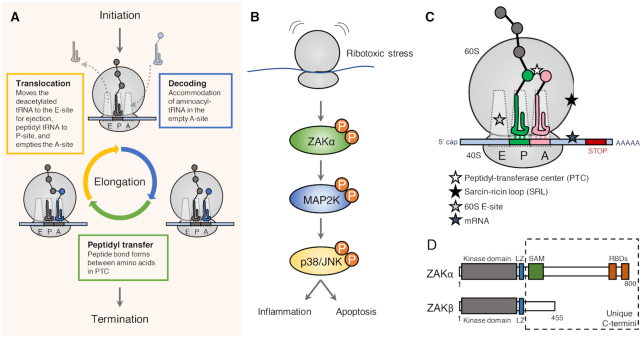Figure 2.
The translation elongation cycle and the ribotoxic stress response. (A) The ribosome can decode messenger RNA (mRNA) and translate it into protein in three sequential events; initiation, elongation and termination. Elongation is a three-step cycle that is repeated until the protein is fully synthesized, and the stop codon is reached. The key processive reactions are (i) the capture of amino acid loaded tRNA, (ii) transfer of the amino acid to the growing polypeptide chain and (iii) the release of vacant tRNA, which occur in the ribosomal A-, P- and E-sites, respectively. (B) Ribotoxic stress is sensed by the MAP3K ZAKα leading to activation of MAPKs p38 and JNK and inflammatory signaling. In case of strong and sustained signaling the cell will undergo regulated cell death. (C) Overview of ribosomal insults known to activate the RSR – see also Table 1. (D) Alternative splicing of the ZAK gene results in two different MAP3Ks, α and β, that share the first 11 exons followed by unique exons. ZAKα is an 800 amino acid protein containing a kinase domain, a leucine zipper (LZ), a sterile-alpha motif (SAM) and two ribosome-binding domains (RBDs). ZAKβ is a 455 amino acid protein that is identical to ZAKα in its N-terminus but has a unique C-terminus.

